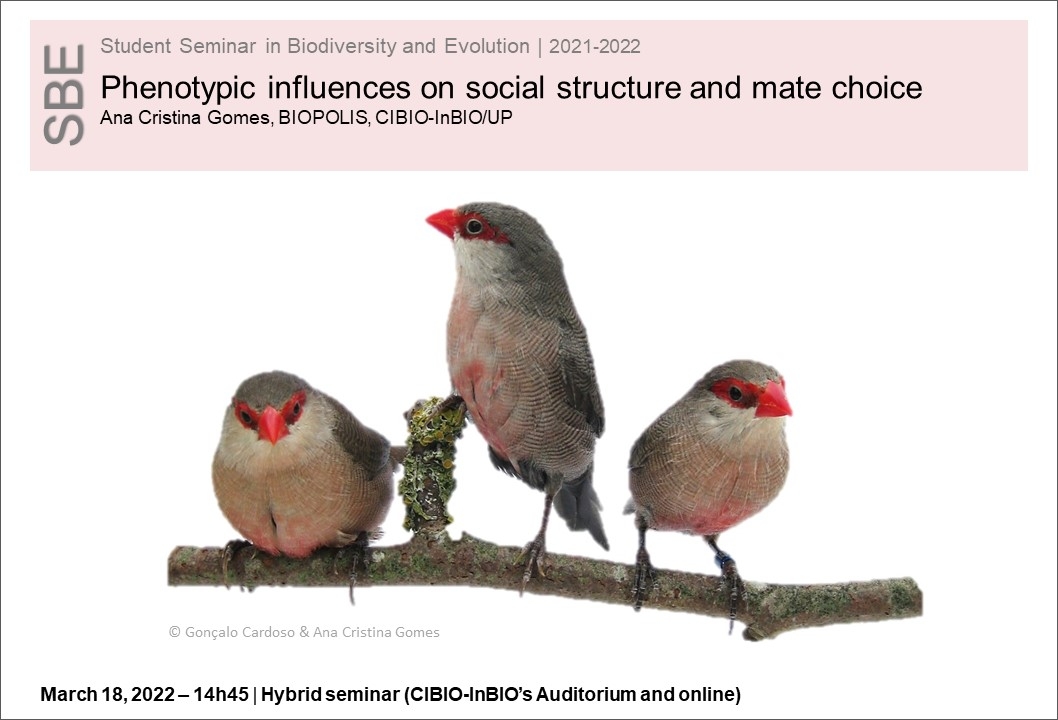Phenotypic influences on social structure and mate choice
18 Mar 2022 - Ana Cristina Gomes, BIOPOLIS, CIBIO-InBIO/UP | 14h45

STUDENT SEMINAR IN BIODIVERSITY AND EVOLUTION
Ana Cristina R. Gomes, from the BIODIV PhD Program, recently submitted her PhD thesis entitled ‘Phenotypic influences on social structure and mate choice’, with supervision of Dr. Gonçalo Cardoso (CIBIO-InBIO/UP) and Dra. Neeltje Boogert (University of Exeter, UK). Ana’s research uses comparative, theoretical, methodological and empirical approaches to understand the evolution of behavioural and ornamental differences among individuals, and the effects of those individual phenotypic differences on sexual and social behaviour. Recently Ana mainly uses the common waxbill (Estrilda astrild) as model system, using data collected from a mesocosm environment at CIBIO-InBIO precincts in Vairão, that allows continuous and detailed monitoring of birds in a semi-natural captive environment. Ana is also part of the Behavioural Ecology (BE) group at CIBIO-InBIO.
[Host: Gonçalo Cardoso, Behavioural Ecology - BE]
Phenotypes are measurable traits of individuals. Ornamental phenotypic traits, in particular, are the focus of much research in sexual selection and mate choice. Recent approaches have expanded the study of ornamentation, and other phenotypes as well, to non-sexual interactions among individuals in the framework of social selection. Here, I aimed to advance our understanding of the evolution of behavioural and ornamental differences among individuals using theoretic modelling approaches, and also to evaluate the effects of individual phenotypic differences on social behaviour and social networks, using the common waxbill (Estrilda astrild) as model system.
In this Seminar, I will do a presentation of my PhD thesis, which comprises theoretical, methodological and empirical work to:
(i) investigate how behavioural plasticity may evolve;
(ii) how different mate choice strategies may explain the diversity of ornamental phenotypic traits;
(iii) and how different phenotypes may influence non-sexual social associations in the highly gregarious common waxbill, using a detailed long-term study of social structure and phenotypes of this gregarious avian species.
This thesis advances knowledge on the topics of animal personality, and how phenotypic differences influence mate choice, long-term associations, and social structure. Based on the results in this thesis, I conclude that (i) stable individual differences in behaviour (i.e. animal personality) can be theoretically expected even in species adapted to unstable environments, and that (ii) sexual signals do not necessarily evolve to have high costs. Also, despite much research interest in the effects of phenotypic differences on animal sociality, (iii) familiarity and long-term associations among individuals appears to be the most important factor shaping social structure in common waxbills. Thus, more attention should be given to familiarity and long-term associations in future studies on animal sociality.
Ana Cristina R. Gomes, from the BIODIV PhD Program, recently submitted her PhD thesis entitled ‘Phenotypic influences on social structure and mate choice’, with supervision of Dr. Gonçalo Cardoso (CIBIO-InBIO/UP) and Dra. Neeltje Boogert (University of Exeter, UK). Ana’s research uses comparative, theoretical, methodological and empirical approaches to understand the evolution of behavioural and ornamental differences among individuals, and the effects of those individual phenotypic differences on sexual and social behaviour. Recently Ana mainly uses the common waxbill (Estrilda astrild) as model system, using data collected from a mesocosm environment at CIBIO-InBIO precincts in Vairão, that allows continuous and detailed monitoring of birds in a semi-natural captive environment. Ana is also part of the Behavioural Ecology (BE) group at CIBIO-InBIO.
[Host: Gonçalo Cardoso, Behavioural Ecology - BE]